
5 minute read
International Nurses Day
Duluth nurses share their COVID experiences
By Andrea Busche
Every May 12 on the anniversary of Florence Nightingale’s birth, we pause to observe International Nurses Day. Celebrated around the world, this special recognition honors the vital contributions made by nurses everywhere.
While nursing is a challenging profession in normal times, it has been made infinitely more difficult during the COVID19 pandemic. Extra personal protective equipment; no- or reduced-visitor policies being enforced at medical facilities; and the constant fear of contracting the virus (and passing it to loved ones) are just some of the additional challenges faced by nurses during this time.
To honor International Nurses Day, we highlight three local nurses. They include: Megan Forsyth, manager, surgical and procedural care and PACU (post-anesthesia care unit) at St. Luke’s hospital; Emily Curley, registered nurse in the MICU (medical intensive care unit) at Essentia Health; and Heather Kohl, registered nurse on the cardiac unit at St. Luke’s.
All three graciously shared some of their experiences working during COVID-19, and the humbling life lessons they’ve learned. These lessons run deep: two of the three contracted the illness themselves, one lost a family member to COVID, and all of them have watched helplessly as their patients have become critically ill, and in some cases died, during the pandemic.
Nevertheless, all three still recommend nursing as a profession.
The nurses
Forsyth is a mom to three young children: Mason, 7; Elliot, 4; and Ivy, 7 months. Her husband, Jim, is a police officer. The family, which also includes a dog, Dottie, and a cat, Pumpkin, live in Hermantown.
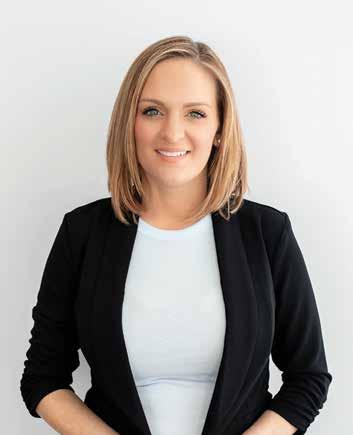
In her role as a manager, Forsyth’s duties include coordinating plans for her patients who have day surgeries and communicating those plans to the hospital. She also helps with scheduling, team building, improving patient stays, and reporting. Although Forsyth is a manager today, she was still a nurse when the pandemic started.
Curley and the rest of the MICU team care for a wide variety of patients who are very ill, including those with surgical complications, gastrointestinal bleeds, sepsis, drug and alcohol overdoses, and other serious concerns. As these patients are very sick, the ratio is typically one nurse to one — or maybe two — patients.
Curley and her husband, John, are newlyweds; they were just married Sept. 17, 2021. They live in the Woodland neighborhood with their German shepherd, Poppy.
Heather Kohl and her team on the cardiac unit see patients with heart attacks, congestive heart failure, atrial fibrillation, and those who need stents and pacemakers, among other heart-related needs.
• 48 years in business
• 6 greenhouses open to the public Fridays, Saturdays, and Sundays starting in May - other days with limited staff available to help
• Summer hours JuneOctober 1, M-W-F
• Professionally trained landscape and maintenance crews ready to go
Garden Center: Take Hwy 35 south to Hwy B, go east on Hwy B 8 miles & turn left to garden center. (715) 399-2527 • missinnegreenhouse.com
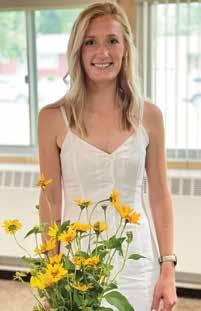
Emily Curley is a nurse in the MICU (medical intensive care unit) at Essentia Health. Poppy, a German shepherd, is a ready-and-willing adventure partner, along with Emily's husband, John.
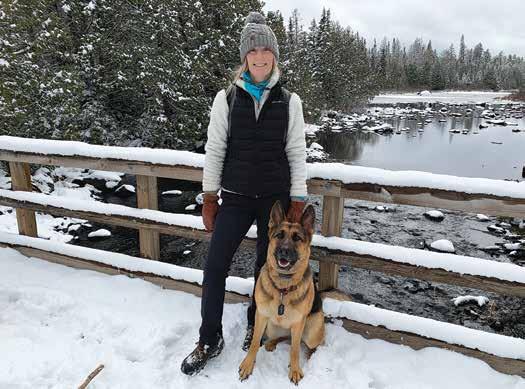
Kohl and her boyfriend, Brian Cody, live in Duluth Heights with their two dogs: Laila, a boxer, and Duke, a mixed-breed dog.
Early COVID-19 experiences
The beginning of the COVID-19 pandemic, back in early 2020, was a frightening time for everyone. But nurses, being “essential workers” at the front lines of the medical field, experienced this fear and uncertainty firsthand.
“I was still a floor nurse when the pandemic started,” Forsyth said. “We all heard about the massive number of deaths in New York City, and there was a lot of fear and uncertainty.”
Continued on page 26
• Huge selection of shrubs, evergreens, perennials and large 3” caliper trees
• Let us help you make your landscape dreams come true!
• Patios, boulder walls, flagstone walkways, custom entrance containers & hanging baskets
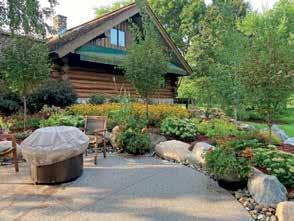
“It was extremely terrifying,” Curley shared. “The virus started on the coasts and worked its way in. Nothing prepares you for that reality.”
“When the pandemic started, I really struggled with anxiety,” Kohl said. “There was a lot of fear surrounding the situation.”
Adapting
As the pandemic progressed, so did policies and procedures at medical facilities. “Regarding our PPE,” Forsyth said, “we had to put items on and take them off in a certain order. It was very time consuming. We never sat down, and were constantly pulled away to help other patients.
“For our very intensive patients with COVID, in order to take care of them, we had to flip them on their stomachs. For some of the heavier patients, this would sometimes take five or six nurses.”
Forsyth became emotional when recalling a critically ill COVID patient.
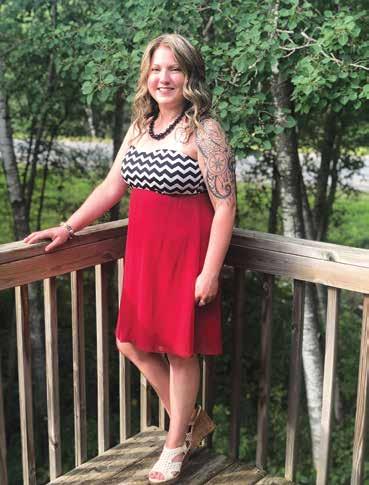
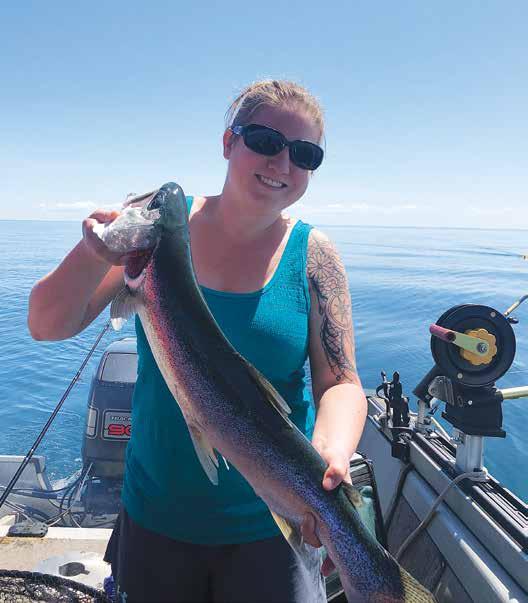
“In the ICU, there was one patient on a C-PAP machine — they had refused a ventilator. Then, when family came, only one person was allowed in at a time to say goodbye.”
“My unit became the dedicated COVID ICU when COVID hit,” Curley shared. “We’re an 11-bed unit, and at any given time all patients had a ventilator. We had to stay in the room with one patient, and it was very isolating. For a while, there were no visitors allowed at all — even at the end of life. What was hardest for me is that we had COVID patients in their 20s all the way up to patients in their 90s. A couple younger individuals passed away, with no underlying health issues, and some of the older patients with comorbidities (multiple illnesses) made a full recovery. We couldn’t predict who was going to do well and who would pass away.” challenging. And some of the patients we saw for heart issues were much sicker because they hadn’t been to the doctor since the pandemic started.”
“During the recent surge, four patients tested positive on our floor,” Kohl said. “There was no room for them in the ICU, so there was a lot of shuffling around to keep people safe.
Kohl also shared her attempts to coordinate final visits with family for patients who were extremely sick. “I tried to arrange a Facetime visit for these patients when visitors weren’t allowed.”
Getting sick
Kohl contracted COVID about two years ago, at the beginning of the pandemic. Although she had mild symptoms and made a full recovery, she did experience some brain fog. An uncle of Kohl’s died from the virus about a year ago.
Forsyth also became sick with COVID. She was pregnant when the vaccine came out, so she waited until after the baby was born to get vaccinated. She unfortunately got sick a week after getting her first dose of the vaccine. Additionally, Forsyth’s husband and three children (including her newborn daughter, Ivy) also contracted COVID. Everybody came through OK. Forsyth’s grandmother contracted COVID, too, and survived.
Lessons
These three nurses have learned plenty of life lessons over the past two-plus years.
“COVID has taught us to be flexible and be more supportive to those around us,” Forsyth said. “We have to make decisions the best we can. I’m definitely learning a lot very quickly. We all have to be a little softer when it comes to change; we need to be fluid.”
“The pandemic has emphasized the value of family,” Curley said. “It’s scary how fast things can change. Also, my faith has been strengthened. So much is out of our control, and I’ve had to lift it up to God. This experience has also emphasized the value of advanced care planning, and end-of-life conversations.”
“This experience has made me a stronger nurse,” Kohl said. “It’s also emphasized the value of family.”
Advice
For those considering a career in nursing, here is what the three nurses had to say. “This pandemic has caused me to question becoming a nurse, which is something I’ve never done,” Kohl said. “But I still love my job. I would still recommend nursing, but you must be a very compassionate, special person to do it well.”
“I’d still definitely recommend nursing,” Curley said. “It provides a great opportunity to help people. And nursing has so many opportunities for personal and professional growth.”
“I would still recommend nursing,” Forsyth added. “There are challenges, but there are challenges with any profession. Our community depends on us to be there for them.” D
Andrea Busche is a Duluth freelance writer.












